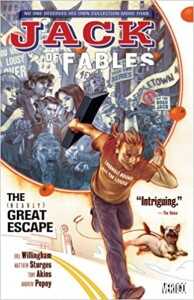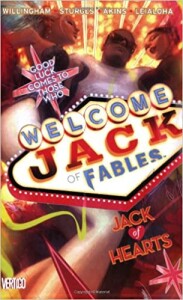 Bill Willingham author, Matthew Sturges, Tony Akins and Andrew Pepoy artists
Bill Willingham author, Matthew Sturges, Tony Akins and Andrew Pepoy artists
Jack of Fables is very much a “your mileage may vary” sort of series. Whether or not you like it depends pretty much entirely on whether or not you like the central character. In this case, that character is Jack, as in “Jack and the Beanstalk,” “Jack the Giant-Killer,” “Jack Be Nimble” and most likely “Jack Nicholson.” Jack is cocky, brash, self-centered to the point of obnoxiousness, and just good enough to pull it off. Depending on how that sort of protagonist rubs you, that means any book detailing his adventures is either a) a hoot and a holler or b) an exercise in grinding away your irreplaceable tooth enamel as the smartass – who no doubt bears an uncanny resemblance to someone you really, really hated in elementary school – gets away with murder because he’s so damn charming.
In The (Nearly) Great Escape, Jack finds himself captured and transported to The Golden Boughs Retirement Home, a relocation camp for escaped Fables (folktales personified, to give the extremely short version – see the ongoing series Fables for more) that’s far more sinister than it seems. On the surface, it seems like a retirement community straight out of West Palm Beach’s worst nightmares. In reality, it’s overseen by a not-quite-human sort named Revise and his unusual henchbeings. There are defenses in the air, on the ground, and magically prepared, all for the express purpose of preventing the escape of even a single Fable. Getting out is, according to the inmates, impossible.
Which, of course, is why Jack has to organize an all-out jailbreak. Not just to escape, mind you – it’s because Jack views the notion of an inescapable prison as an affront to his very Jack-ness, a challenge to his core sense of self. That, of course, is what Golden Boughs is all about – taking Fables and gentling them, writing their stories out of existence and neutering what once made them so powerful.
As for The (Nearly) Great Escape itself, it’s a mixed bag. There’s some extremely clever and daring stuff here. One of the Fables who plays a key role is straight out of a folktale that doesn’t get much play in these theoretically enlightened times. At the same time there’s plenty of cheap humor at the expense of easy targets, like Dorothy’s less-than-sympathetic response when Toto has an unfortunate encounter with a tiger. What ultimately propels the story and makes it interesting is the contest of wills between Jack and Revise, and their chess game using the various Fables and staff to check each other.
 The followup Jack of Hearts, is an altogether different kettle of fish. On the run from the Golden Boughs’ recapture teams, Jack and a few other Fables hole up in the Rocky Mountains. To pass the time, Jack tells the others a story of how he spent some time as Jack Frost and how the Snow Queen turned evil as a result. It’s a fairly standard narrative of a protagonist being too clever for his own good and a lot of other people suffering the consequences as a result.
The followup Jack of Hearts, is an altogether different kettle of fish. On the run from the Golden Boughs’ recapture teams, Jack and a few other Fables hole up in the Rocky Mountains. To pass the time, Jack tells the others a story of how he spent some time as Jack Frost and how the Snow Queen turned evil as a result. It’s a fairly standard narrative of a protagonist being too clever for his own good and a lot of other people suffering the consequences as a result.
The second half of the story arc is a bit hotter, though. Jack ends up in Vegas, where through a series of inevitably longshot circumstances, he finds himself married to the lovely daughter of the owner of a local casino. For a brief, shining moment, everything is perfect. Jack is married, in love, rich, and in his element.
Which is why it all has to come crashing down, through the agency of some Belgian mobsters and the very particular character they’re working for: Lady Luck. Here, when up against some actual adversity not of his own making, Jack becomes a much more interesting character. When purpose drives the talents and power that are normally diffused by ego and debauchery, the more frightening side of Jack emerges, and it’s a welcome tonic to the occasionally wearying smartass the reader sees the rest of the time.
(Vertigo, 2007)
Publishers Weekly has a Bill Willingham author page.
